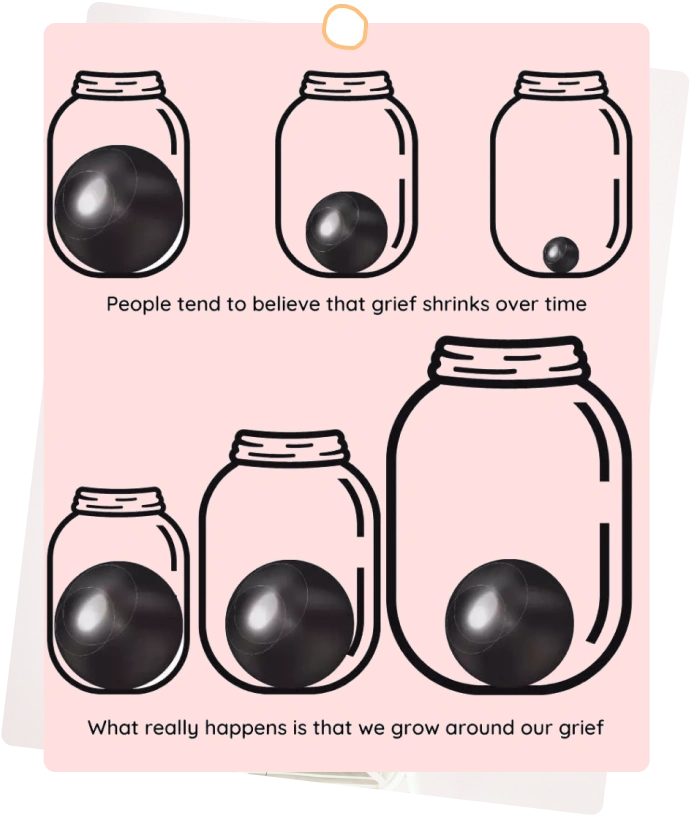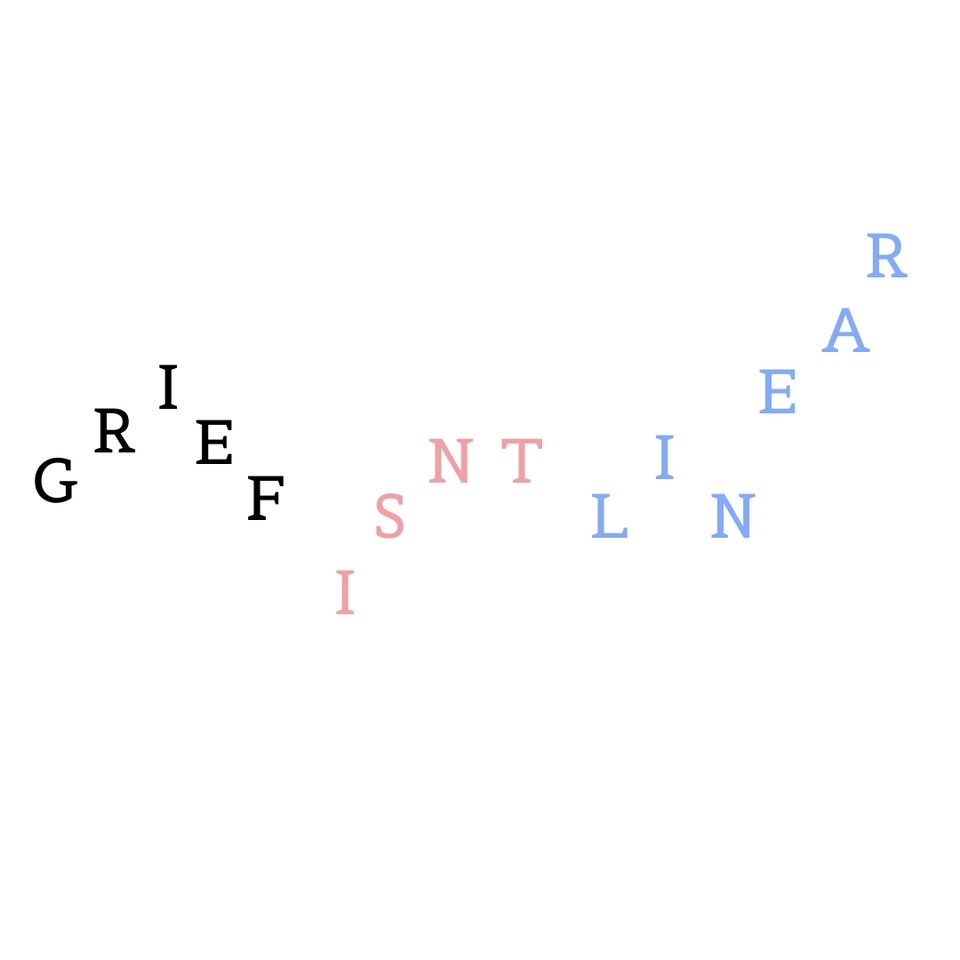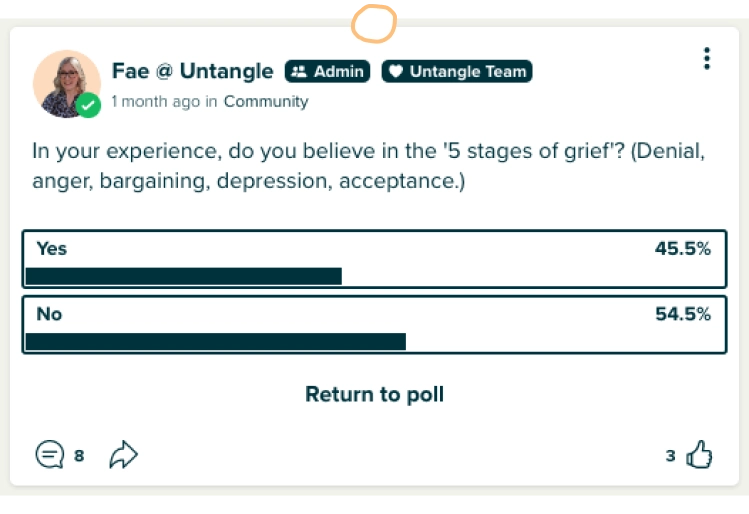Whilst the sad truth is that death and loss are universal experiences, responses to loss are not: they’re unique, individual and personal, characterised by the circumstances and meaning of that loss, not to mention the resources available to a person.
Some will cry, feel distress, withdraw, others will become fixated on purpose or a task at hand – the list is endless and each reaction is normal. There is no right or wrong. Everyone grieves differently.
This is why stages of grief theories can cause problems. Culture has made it seem that grief is linear and that there is an expectation to feel a certain way, but for anyone coping with grief, these ideas can be harmful.
With this in mind, we spoke to Untangle members about their experience of loss and the grieving stages, as well Dr Lizzie Paddock, Psychologist and Assistant Professor in Forensic Psychology at the University of Nottingham.
Jump to section:
- What can grief feel like?
- 5 stages of grief
- 7 stages of grief
- Is what I’m feeling normal? Q&A
- Tonkins model of grief
- Can the stages be trusted?
- How to care for yourself
- Where to find support
What can grief feel like?
Grief can manifest itself in many different ways.
From physical symptoms through to behavioural changes, you may experience a number of reactions or none at all.
The below is a non-exhaustive list of possible reactions to loss:
| Reaction type | How grief might present itself |
|---|---|
| Physical |
|
| Emotional |
|
| Cognitive |
|
| Behavioural |
|
| Spiritual |
|
– See our symptoms of grief article for further insight –
The stages of grief: what are they?
The 5 stages of grief theory was developed in 1969 by psychiatrist, Dr Kübler-Ross, as a way of describing the emotional process experienced by those facing their own death.
The theory quickly gained traction and embedded itself into the public psyche as the model for dealing with bereavement and, in turn, became synonymous with the grieving process.
What are the 5 stages of grief?
Denial
Denial is largely considered the stage that holds back your feelings of grief. Common thoughts are simply not believing that the loss has happened or imagining another, nicer state of reality.
“I was convinced for months that my loved one was going to enter the room at any moment.”
Anger
Anger can present itself in different ways, from bitterness to blind fury. It can be directed at the person we’ve lost or anyone that enters our mind at that moment in time. It is often seen as a masking effect, in that other emotions may not be immediately obvious when anger’s at play.
Bargaining
Bargaining has been described as a way to regain some level of control by wanting to affect the situation at hand. This usually surfaces in the form of ‘what if’ and ‘if only’ statements.
“If only I told them…”
Depression
A sense of isolation, sadness and a longing for previous times are typically associated with this phase. As is the theme of this article, depression can present itself in various forms, such as fatigue, despair, anxiety, not wanting to eat, eating too much, an inability or want to do anything, plus much more.
Acceptance
This isn’t getting over your loss, but rather acknowledging it and recognising that there are better days ahead.
What are the 7 stages of grief?
Over the years, other stages have been added to Kübler-Ross’s model. You might have heard of the 7 stages of grief, which adds ‘shock and disbelief’, ‘pain and guilt’ and ‘reconstruction’ into the mix. Just as with the 5 stages, this presents itself as a linear process that is often untrue to life.
The seven stages of grief are:
- Shock and disbelief
- Pain and guilt
- Anger and bargaining
- Depression
- The upward turn
- Reconstruction
- Acceptance
Is what I’m feeling normal?
A stages of grief Q&A
Question:
“I’ve looked through both the 5 stages of grief and 7 stages of grief models, but I’m not experiencing that journey at all. I used to be sociable, now I keep myself to myself. I lack confidence and I cannot accept that my husband has gone.
It’s been over 3 years – surely I should be onto another, more acceptable stage by now? Is what I’m feeling even normal? The stages of grief suggest not.“

Sue, Untangle member
Answer:
“Stages theories of grief are present throughout popular culture. However, evidence has shown that the grieving process is ‘neither a linear nor a fixed progression of stages’. The truth is, people may never experience some of these stages. Everyone’s grief is unique to them. And most people will not experience them in that order – instead, jumping back and forth between stages. Some researchers prefer to talk about the ‘components’ of grief.
The most important way to help yourself while grieving is to take care of yourself and your needs – being aware of how you are feeling.
For many of us, talking about loss is an incredibly painful and difficult thing. It takes strength and courage to describe how you are feeling after a bereavement, and all too often, we avoid the conversation because we can’t find the right words. Do you feel this may be contributing to why you are not wanting to be around others?
Grief is a huge trauma, and you are reeling from the shock of your loss. Be patient with yourself. There is no timeline for how long grief lasts, or how you should feel after a particular time.“

Dr Lizzie Paddock, Psychologist and Assistant Professor in Forensic Psychology
Growing around your grief: Tonkins model
Lois Tonkin is a grief counsellor who coined the term ‘growing around grief’ after counselling clients who had experienced loss.

She describes that rather than grief disappearing over time, it stays roughly the same, and the life of a bereaved person grows around it as they have new experiences and begin to look forward.
At times, that grief can feel just as painful as it did at the beginning, and at other times, it’s in the background.
How can Tonkins model of grief help?
This frame of thinking means you can both be growing and grieving at the same time. Whilst there may always be a pang of sadness resting on your shoulder, you can make progress. Grief doesn’t go away, nor should you expect it to, but you can grow around it.
Many of our members have explained that they prefer this way of thinking as it steers away from grief having an endpoint, and instead explains grief as something that forms part of our identity, ever-present throughout the good and bad moments in our lives.
The stages of grief: so, can they be trusted?
If you take one thing from this article, let it be that the components of the models listed are things that you may experience – ‘may’ being the key word.
In fact, Kubler-Ross herself later said that she regretted the way her model was viewed.
This is something that David Kessler, co-author of On Grief & Grieving, also said, “the stages have evolved since their introduction and have been very misunderstood… They were never meant to help tuck messy emotions into neat packages. They are responses to loss that many people have, but there is no typical loss.” Source

So, in short, don’t hold yourself to these models.
They can provide a level of comfort by showing that you’re not alone in feeling the way you do, but grief is inherently a unique experience; everyone will grieve in different ways.
This is where we thoroughly recommend using a peer-to-peer support service, offering the chance to connect with others over shared experiences means you can discuss loss instead of trying to compare yourself to a psychological theory or model.
How to care for yourself when grieving
The basics
- Listen to your body:
- If you need to rest or sleep, then do. Trauma is hard for the body to process and is tiring.
- Look after yourself:
- Try to eat healthy food and get outside in nature. It won’t take the pain away but looking after your basic health will ensure you don’t make things worse for yourself.
- Avoid numbing substances:
- Whilst it might feel like these take the pain away, they don’t. Instead, they delay those feelings from surfacing and extend the amount of time you spend in the ‘acute grief’ phase.
Your behaviour
- Accept change:
- You might notice your sleeping patterns or eating patterns change in the wake of a loss. These will return to normal so don’t fret. Do what
- You’re exactly where you need to be:
- Don’t feel any pressure to be or act in a certain way. Some people like to keep busy and go out lots, others stay in bed and watch TV. Do what feels right for you.
- Feel your feelings:
- If you need to cry, cry. If you want to laugh, laugh. Grief is not all sadness – sometimes it’s guilt, anger, joy and even relief. Try to embrace and lean into your feelings, rather than avoiding or pushing them down.
Your friends
- Ask for and accept help:
- If people offer to drop food round or take the kids for a few hours, take them up on it. Remember, you would do the same for them.
- Try to be understanding:
- Some of your closest friends may avoid you in your grief, whilst others will surprise you with their kindness. Try not to be too angry with those who avoid you – their silence is usually because of their own discomfort around grief and death, not because they don’t love or care about you.
- Be honest:
- You may feel some pressure to return to ‘normal’ because you worry your feelings may make others uncomfortable, but that will only make you feel more isolated. Open up and talk about your grief, even if it’s years from the loss. True friends will want to be there for you.
Where to find support
Peer bereavement support
- Untangle’s app can help you to meet others who have also experienced a loss and help you to feel less alone.
Education
- Read advice:
- The Untangle website has lots of free articles on grief and bereavement. Books can also be really helpful and we’ve rounded up our 30 favourite books on grief here.
- Follow social media accounts:
- There are lots of brilliant Instagram accounts, subReddits and private Facebook groups on the subject of grief which can help you to understand that what you’re feeling is normal.
- Listen to podcasts:
- Cariad Lloyd’s Griefcast features interviews with famous people who have experienced grief, which can help you to realise that you’re not the first person to walk this path.
Therapy
- Consider 1-2-1 therapy:
- Many people find bereavement counselling or therapy helpful to navigate the choppy waters of loss. Untangle can match you to the perfect affordable bereavement therapist. Take our quiz here to get started.
Support as a carer
- If you’re caring for an elderly parent:
- Information and advice:
- If you’ve now become an unpaid carer as the result of a death:
Urgent support
- If you feel you’re in crisis, don’t delay. Call The Samaritans on UK 116 123.
If you want to share how you’re feeling, ask questions to others who have lost or simply read their stories, head on over to the Untangle community via the Untangle Grief app.




